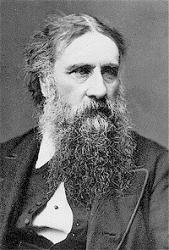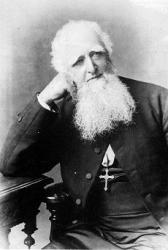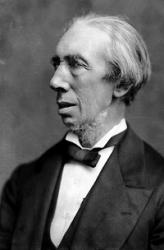Planning worship?
Check out our sister site, ZeteoSearch.org,
for 20+ additional resources related to your search.
- |
User Links
Person Results
‹ Return to hymnal




Export as CSV
George Macdonald

1824 - 1905 Person Name: George MacDonald, 1824-1905 Hymnal Number: 48 Author of "O Lord of life, thy quickening voice" in The Church Hymnary (3rd Ed.) Macdonald, George, LL.D., was born at Huntly, Aberdeenshire, Dec. 10, 1824, and educated at King's College, Aberdeen, where he graduated M.A., and from which he afterwards received the honorary degree of LL.D. For a brief time he studied for the Congregational ministry at Highbury College, London, and then became the Minister of the Congregational Church at Arundel, Sussex (1850-53). He afterwards preached for a short time to a small company at Manchester and Bolton. Relinquishing the ministry, he became Lecturer on English Literature at King's College, London, and ultimately gave himself up entirely to literary work. Dr. Macdonald has acquired a great reputation by means of his works of fiction, most of which were originally contributed to magazines, and the most notable of which are David Elginbrod; Robert Falconer; Alec Forbes of Howglen; and Annals of a Quiet Neighbourhood. He was some time Editor of Good Words for the Young, and wrote England's Antiphon for Macmillan's Sunday Library. His poetical works are:—
(1) Within and Without, 1855; (2) The Disciple, and Other Poems, 1860; (3) The Diary of an Old Soul (printed for private circulation), 1867"; (4) Exotics, a volume of translations from the German (most of which first appeared in the Sunday Magazine), 1876; and (5) A Threefold Cord, 1883, part of which previously appeared in his Works of Fancy and Imagination, 10 vols., 1871.
Most of his original hymns were contributed to Hymns and Sacred Songs for Sunday Schools and Social Worship, &c, published by Fletcher and Tubbs, Manchester, in 1855 (2nd. edition, 1856), and of which his brother, and the Rev. G. B. Bubier were the editors. The original hymns, which are signed "G. Macdonald," in this collection are:—
1. A quiet heart, submissive, meek. The Meek inherit the Earth.
2. Daylight fades away. Second Advent.
3. Father, I well may praise Thy name. Sunday Morning.
4. Father, these souls of ours have been. Blessed are the Pure in Heart.
5. If we were longing for the food. Blessed are they that Hunger and Thirst after Righteousness.
6. It was an awful hour that gave. Blessed are the Merciful.
7. Let Thy own voice, 0 Father, say. Blessed are they that mourn.
8. 0 Son of Man, Thy Name by choice. Blessed are the Meek.
9. Our Father, hear our longing prayer. Blessed are the Poor in Spirit.
Some of these hymns were afterwards revised by their author. The next two are from The Disciple, and Other Poems, 1860 :—
10. O God, Whose daylight leadeth down. Evening.
11. O Lord [God] of life, Thy quickening voice. Morning.
Dr. Macdonald's hymns are rich in ideas, but are touched with a mysticism which renders them a little difficult of apprehension. They are however of great value in setting forth truths rarely expressed in hymns, and are likely to grow in favour. [Rev. W. Garrett Horder]
-- John Julian, Dictionary of Hymnology (1907)
=======================
http://en.wikipedia.org/wiki/George_MacDonald
George Macdonald
Benjamin Milgrove
1731 - 1810 Person Name: Benjamin Milgrove, 1731-1810 Hymnal Number: 33ii Composer of "HARTS" in The Church Hymnary (3rd Ed.)
Benjamin Milgrove
Henry Lahee
1826 - 1912 Person Name: Henry Lahee, 1826-1912 Hymnal Number: 48 Composer of "NATIVITY" in The Church Hymnary (3rd Ed.) Born: April 11, 1826, Chelsea, London, England.
Died: April 29, 1912, London, England.
Lahee studied under John Goss and William Sterndale Bennett. He played the organ at several churches, including Holy Trinity Church, Brompton (1847-74). He won prizes for his compositions in Bristol, Manchester, Glasgow, and London, and set to music poems by Edgar Allen Poe ("The Bells"), Henry Wadsworth Longfellow ("Building of the Ship") and Alfred Tennyson ("Sleeping Beauty"). His works include:
Metrical Psalter, with William Irons, 1855
Famous Singers of Today and Yesterday, 1898
One Hundred Hymn Tunes
Sources:
Frost, p. 680
CS Concordance, pp. 246-47
Nutter, p. 460
--www.hymntime.com/tch
Henry Lahee
Thomas O. Summers
1812 - 1882 Person Name: Thomas Osmond Summers, 1812-82 Hymnal Number: 49 Author of "The morning bright, with rosy light" in The Church Hymnary (3rd Ed.) Summers, Thomas Osmond, D.D., LL.D., son of James Summers, was born near Corfe Castle, Dorsetshire, England, Oct. 11, 1812. Proceeding to the United States in after years, he was admitted to the Baltimore Conference in 1835. From 1840 to 1843 he was a missionary in Texas; removing to Tuscaloosa, Alabama, 1844, and Charleston, South Carolina, 1846. From 1845 he acted as Secretary of the Conference of the Methodist Episcopal Church, South, and was also Book Editor. Subsequently he was Professor of Theology and Pastor of Vanderbilt University. He was Chairman of the Hymn Book Committee of the Methodist Episcopal Church, and edited the Songs of Zion, 1851, and the Wesleyan Psalter, 1855. He died in May 1882. Dr. Summers is the author of several original works, and of the following hymns:—
1. The morning bright, With rosy light. Morning.
2. The daylight fades, The evening shades. Evening.
Concerning these Morning and Evening hymns Dr. Summers says:—
”My first child was born in January, 1845. When she was about a year old, as I was descending the Tombigbee River in a little steamer, I wrote a morning Hymn for her on the back of a letter, transcribed it when I reached Mobile, and sent it to her at Tuscaloosa. That was the origin of ‘The morning bright.' When editing the Southern Christian Advocate, I put it without name in the Child's Department. It was copied into the religious papers generally, and into books. My second child was born in 1847, and for her I wrote ‘The daylight fades,' as far as I can recollect, about 1849. . . . Both of these children for whom they were written are now singing hallelujahs with the angels." (Stevenson's Hymns for Church & Home, Biog. Index, 1873.)
These hymns have attained to great popularity as children's hymns, and are found in numerous collections both at home and in Great Britain. The 3rd line of stanza i. of the Morning Hymn should read: "Has waked me up from sleep," and not as found in many collections. [Rev. F. M. Bird, M.A.]
-- John Julian, Dictionary of Hymnology (1907)
Thomas O. Summers
Herbert Stephen Irons
1834 - 1905 Person Name: Herbert Stephen Irons, 1834-1905 Hymnal Number: 50(ii) Composer of "ST. COLUMBA" in The Church Hymnary (3rd Ed.) Born: January 19, 1834, Canterbury, Kent, England.
Died: June 29, 1905, Nottingham, England.
Irons was a nephew of the brothers Stephen & George Elvey. He became a chorister at Canterbury Cathedral under T. E. Jones. After studying music under Stephen Elvey at Oxford, he was appointed organist at St. Columba’s College, a large public school at Rathfarnham, near Dublin, Ireland. He stayed there only a few months before being offered the position of organist at Southwell Minister. From Southwell, he went to Chester as assistant organist to Frederic Gunton. Three years later, he accepted an appointment at St. Andrew’s Church, Nottingham, where he remained until his death.
--www.hymntime.com/tch
Herbert Stephen Irons
John Antes
1740 - 1811 Person Name: John Antes, 1740-1811 Hymnal Number: 33i Composer of "MONKLAND" in The Church Hymnary (3rd Ed.) John Antes (b. Frederick, PA, 1740; d. Bristol, England, 1811) was a missionary, watchmaker, business manager, and composer. Born near the Moravian community of Bethlehem, Pennsylvania, he was trained at the Moravian boys' school and later received religious education and further training as a watchmaker in Herrnhut, Germany. From 1770 to 1781 he served as a missionary in Egypt and from 1783 until his death was the business manager of the Moravian community in Fullneck, England. Although music was his avocation, Antes was a fine composer and musician. Among his compositions are a number of anthems, several string trios, and over fifty hymn tunes.
Bert Polman
John Antes
Henry Lascelles Jenner

1820 - 1898 Person Name: Henry Lascelles Jenner, 1820-98 Hymnal Number: 15 Composer of "QUAM DILECTA" in The Church Hymnary (3rd Ed.) Jenner, Henry Lascelles, D.D., was educated at Trinity Hall, Cambridge (LL.B. 1841, in honours; D.D. 1867). Taking Holy Orders in 1843, he held several appointments until 1866, when he was consecrated Bishop of Dunedin. He retired in 1871. He is at present [1891] vicar of Preston-next-Wingham, Diocese of Canterbury, to which he was presented in 1854. His hymn in the 1889 Supplemental Hymns to Hymns Ancient & Modern, "Christians, sing out with exultation" (Christmas), is a translation of "Faisons éclater notre joie." See p. 391, ii.
--John Julian, Dictionary of Hymnology, Appendix, Part II (1907)
=============
Jenner, H. L., p. 1574, i. Bp. Jenner was born in 1820, and died in 1898. In C. W. A. Brooke's Additional Hymns, 1903, Nos. 962-966 are by Bp. Jenner and "A. Jenner." They are the "Catechism in Verse," and consist of 50 stanzas and a "Kyrie." They are well adapted for singing in connection with catechising in Church and School.
--John Julian, Dictionary of Hymnology, New Supplement (1907)
Henry Lascelles Jenner
Basil Harwood

1859 - 1949 Person Name: Basil Harwood, 1859-1949 Hymnal Number: 12 Composer of "LOWER MARLWOOD" in The Church Hymnary (3rd Ed.) Basil Harwood (11 April 1859 – 3 April 1949) was an English organist and composer.
Basil Harwood was born in Woodhouse, Gloucestershire (the second youngest of 12 children) on 11 April 1859. His mother died in 1867 when Basil was eight. His parents were Quakers but his elder sister Ada, on reaching 21 in 1867, converted to the Anglican Church. Basil was allowed to attend the ceremony at the Church of England in Almondsbury and this is where he was first drawn to organ music and choral singing. His father, Edward, remarried two years later in 1869 to a lady from an Anglican family. Basil was now sent to the Montpellier School in Weston-super-Mare for a year. In 1871, at 12 he was enrolled in Clevedon, the preparatory school for Charterhouse where he was first to formally study music.
He went up to Charterhouse in 1874 and left in 1876 having won a leaving Exhibition to Trinity College, Oxford where he initially studied Classics (1879) and Modern History (1880). He then studied for a further two years, 1881–1882, at the Leipzig Conservatory under Carl Reinecke and Salomon Jadassohn. It was here in 1882, Basil composed his first anthem for chorus and organ "O Saving Grace." He returned from Leipzig to realise that he had now passed the age limit to study music formally.
In 1883, Basil became organist of St. Barnabas Church, Pimlico completing his Sonata in C# Minor here in 1885, selling the copyright to the publisher Schott for one shilling a year or two later. After this success, he then moved to Ely Cathedral in 1887 where he wrote the bulk of Dithyramb, possibly his greatest organ work. His final appointment was as organist at Christ Church, Oxford and as precentor of Keble College, Oxford from 1892 to 1909. Whilst there he co-founded and conducted the Oxford Bach Choir which helped to earn him his degree as Doctor of Music. He conducted the Oxford Orchestral Association (1892–1898).
He was musical editor of the 1908 Oxford Hymn Book and Examiner for Musical Degrees (1900–1925).
During this time, he met and married Mabel Ada Jennings (the daughter of George Jennings) (who had become a pupil of his in 1896) at All Souls St. Marylebone, London (27 December 1899). Mabel had studied music herself, piano and composition, and was also a writer. She may well have composed lyrics for some of his lesser known tunes. At an advanced age she wrote a small volume of collected poems named Questing Soul.
He retired early at 50 (in 1909) after the death of his father, Edward Harwood, from whom he inherited the family estate of Woodhouse having outlived his seven older brothers. Soon after moving in he had a three manual chamber organ built in the library by Bishop & Sons of Ipswich (now in Minehead Parish Church), on which he promptly finished his Sonata in F# Minor. He continued to compose prolifically.
He was a keen walker, and named many of his hymn tunes after local places that he loved to visit, the most notable being the hymn tunes such as Tockington, Olveston, Almondsbury and Thornbury.
In 1936 advancing in years, he let the Woodhouse estate and moved to Bournemouth. Part of the estate, Woodhouse Down, was later sold to his contemporary Robert Baden-Powell who was two years older than he was and who had also attended Charterhouse School, and is used as a Scout Camp to this day.
In 1939, at eighty, he moved to London, taking a flat in Fleet Street. After a long life, he died on 3 April 1949, eight days short of his 90th birthday, at Courtfield Gardens in the Royal Borough of Kensington, London. A memorial service was held in St Paul's Cathedral on 22 April 1949. Mabel survived him, dying shortly before her 103rd birthday on 20 July 1974. He was survived by two sons; Major John Edward Godfrey Harwood (1900–1996) and Basil Antony Harwood (1903–1990) Senior Master of the Supreme Court, Q.B.D. and Queen's Remembrancer.
His remains are interred in St. Barnabas Church, Pimlico and marked by a plaque inset in floor of the chancel, close to where he would have stood to conduct the choir.
He composed cantatas, church music and works for the organ; his Service in A flat, the anthem O how Glorious and the hymn tunes LUCKINGTON ("Let all the world in every corner sing") and THORNBURY ("Thy hand O God has guided"), first used during a festival of the London Church Choir Association, remain in the Anglican repertory.
--en.wikipedia.org/wiki
Basil Harwood
George A. Macfarren

1813 - 1887 Person Name: George Alexander Macfarren, 1813-87 Hymnal Number: 20a Composer of "[O come let us sing unto the Lord]" in The Church Hymnary (3rd Ed.) George Alexander Macfarren, Mus. Doc.; b. London, 1813; d. London, 1887
Evangelical Lutheran Hymnal, 1908
=======================
Born: March 2, 1813, Westminster, England.
Died: October 31, 1887, St. Marylebone, England.
Buried: Hampstead Cemetery, London, England.
Brother of Walter Macfarren, George was a principal of the Royal Academy of Music; professor at Cambridge University; conductor at Covent Garden, London; program note writer for the Philharmonic Society; and editor of Handel and Purcell. He wrote 18 operas, 13 oratorios and cantatas, 9 symphonies, and 162 songs. He went blind in 1860, and was knighted in 1883.
Sources:
Frost, p. 681
Lightwood, p. 189
Nutter, p. 460
http://www.hymntime.com/tch/bio/m/a/c/macfarren_ga.htm
===============================
http://en.wikipedia.org/wiki/George_Alexander_Macfarren
George A. Macfarren


 My Starred Hymns
My Starred Hymns


